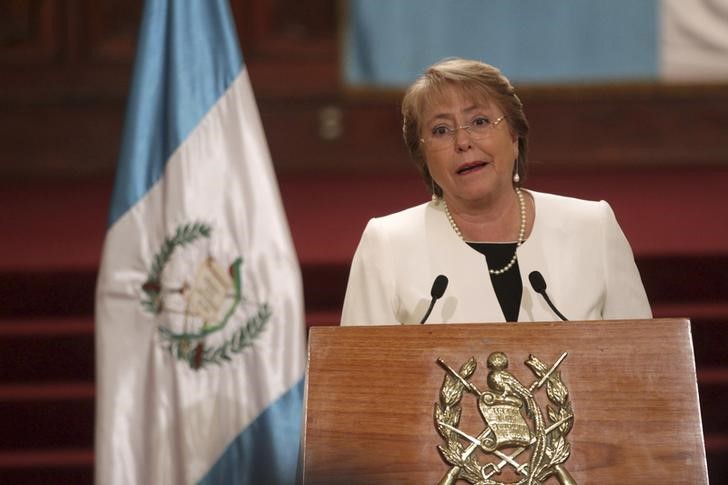SANTIAGO (Reuters) - Chilean President Michelle Bachelet attempted to draw a line under recent scandals that have angered Chileans and hit her popularity, announcing measures to regulate political financing, and setting a date to draw up a new constitution.
Bachelet's popularity has slumped to a historic low in recent weeks, hurt by accusations that her daughter-in-low benefited from preferential access to a bank loan.
A probe into fake tax receipts being used by high-profile companies to fund political parties has also led to widespread disenchantment with the political class in general, in a country usually considered far less corrupt than others in Latin America.
In the future, political parties will be funded by the state, businesses will not be allowed to contribute, and party lists must be cleaned up, announced Bachelet, in a speech broadcast to the nation on Tuesday night.
"We are looking to eradicate bad practices in politics, in business and in the relation between the two," said Bachelet.
"They are severe measures, and some wanted to resist them ...(but) democracy and politics belong to everyone and we cannot tolerate them being captured by the power of money."
Around 22 percent of countries worldwide ban corporate donations to political parties, according to the Institute for Democracy and Electoral Assistance.
Bachelet also set a date for beginning constitutional reform, an election pledge that has been sidelined by a full tax and education reform agenda, as well as the need to respond to an economic slowdown and a series of natural disasters.
Starting in September, the month of an annual patriotic 'fiestas patrias' celebration, Chile will "open up dialogue on the constitutional process to citizens," said Bachelet.
As part of her electoral campaign coming into a second term, Bachelet promised to completely overhaul the constitution, which dates from Augusto Pinochet's 1973-1990 dictatorship.
She did not give specifics about how the process would work, but changing the constitution would require a two-thirds majority in Congress under current rules, which the president does not currently command.
Bachelet said she would also take personal responsibility to ensure the speedy passage of a bill that would limit the number of terms a member of Congress can serve.
Local politicians gave a generally cautious welcome to Bachelet's announcement, but not everyone was convinced.
"If the government is hoping to press on without addressing its weak points, problems will inevitably persist," said political scientist Kenneth Bunker.
